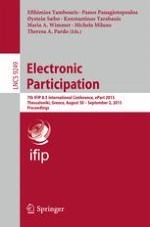2015 | Book
Electronic Participation
7th IFIP 8.5 International Conference, ePart 2015, Thessaloniki, Greece, August 30 -- September 2, 2015, Proceedings
Editors: Efthimios Tambouris, Panos Panagiotopoulos, Øystein Sæbø, Konstantinos Tarabanis, Maria A. Wimmer, Michela Milano, Theresa Pardo
Publisher: Springer International Publishing
Book Series : Lecture Notes in Computer Science
